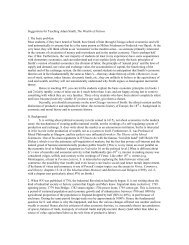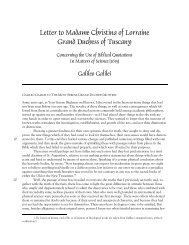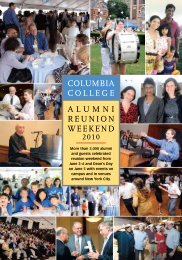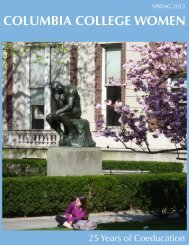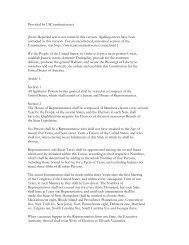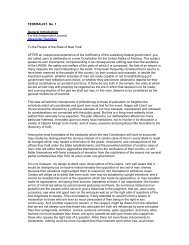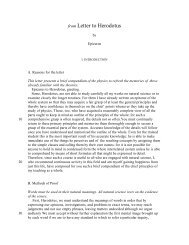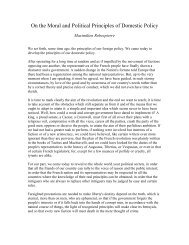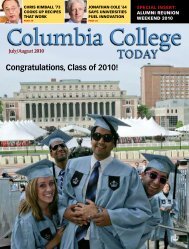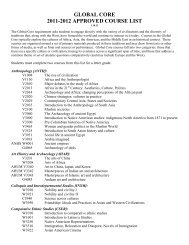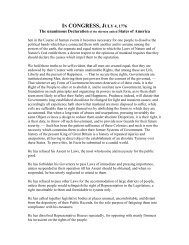A Passion for Science - Columbia College - Columbia University
A Passion for Science - Columbia College - Columbia University
A Passion for Science - Columbia College - Columbia University
Create successful ePaper yourself
Turn your PDF publications into a flip-book with our unique Google optimized e-Paper software.
<strong>Columbia</strong> CollEgE Today A PASSION FOR SCIENCE<br />
the pastures originally cleared in areas surrounding the fragments<br />
became re<strong>for</strong>ested. De<strong>for</strong>estation in the tropics is continuing at rates<br />
that lack historical precedent resulting in the extensive fragmentation<br />
of species-rich rain <strong>for</strong>ests. Insights from Uriarte’s project are<br />
likely to be relevant to what is happening to <strong>for</strong>ests in other areas.<br />
Uriarte’s work in Peru involves not only biologists but also anthropologists<br />
and climate scientists. For centuries, farmers in the<br />
Peruvian Amazon have used burning to manage agricultural fields,<br />
and more recently, to clear and clean pastures. Yet the landscapes of<br />
the region are being rapidly trans<strong>for</strong>med by clearing <strong>for</strong> large-scale<br />
plantation agriculture, especially biofuel production, by extensive<br />
ranching and by new patterns of smaller-scale land uses by non-<br />
Amazonian migrants who arrive in large numbers from the coast<br />
and highlands of Peru. Large fires escaped from burning fields and<br />
pastures have become common dry season events that ravage <strong>for</strong>ests,<br />
farms and settlements in much of Amazonia and recently, these<br />
destructive fires have become a major problem along this region.<br />
The immediate causes of increased fire susceptibility reflect a<br />
variety of changes in economic policies. The policies at stake have<br />
affected agricultural development and land settlement in the Ama-<br />
the seniors who will graduate from <strong>Columbia</strong><br />
<strong>College</strong> this May were not yet born when<br />
<strong>Columbia</strong> first began to consider how to add<br />
a science component to the Core Curriculum.<br />
The debate began in 1982, when Professor<br />
David Helfand, now the chair of the Department of<br />
Astronomy, was asked to head the Committee on the<br />
Place of <strong>Science</strong> in a Liberal Curriculum.<br />
“When I got here in 1977, I was delighted to see that<br />
the faculty actually had the temerity to say, ‘These ideas<br />
are important, these books are important, and I don’t<br />
care what you are majoring in, you will all do this together,’<br />
” he says. “I was simultaneously appalled that this<br />
Core Curriculum, which was advertised in the catalog as<br />
the intellectual arms of the <strong>University</strong> and preparation <strong>for</strong><br />
life as an intelligent citizen, consisted of seven humanities<br />
courses, zero math courses, zero science courses<br />
and zero social science courses.”<br />
For 22 years, Helfand worked with faculty, administrators and<br />
alumni, many of whom had a deep emotional attachment to the Core<br />
as it was, in an ef<strong>for</strong>t to create a science component <strong>for</strong> the Core<br />
Curriculum. The basic goals of the project were “to show students<br />
that science is interesting because of the things we don’t understand,<br />
not the set of facts that we do,” and “to inculcate in them a set of<br />
quantitative reasoning skills that many students lack,” he says.<br />
In 2004, <strong>Columbia</strong> launched the Frontiers of <strong>Science</strong> course on<br />
a trial basis. In this one-semester class, which <strong>College</strong> students<br />
generally take in either the fall or spring semesters of their first year,<br />
students attend a series of lectures<br />
presented by noted senior faculty<br />
on current research, and then meet<br />
in smaller seminar-style groups to<br />
discuss the topics covered.<br />
The topics change every year<br />
as research advances. More than<br />
30 tenured professors have taught<br />
the course, and each lecture must<br />
be rehearsed twice in front of the<br />
faculty be<strong>for</strong>e it is presented to the<br />
students.<br />
MAY/JUNE 2011<br />
25<br />
zon Basin, and led to rising prices <strong>for</strong> tropical commodities including<br />
biofuels that might serve as substitutes <strong>for</strong> petroleum products.<br />
Many of these changes result from a series of enacted policies and<br />
decisions taken on national and local levels. The disruptions produced<br />
by rapid land use and demographic trans<strong>for</strong>mations are<br />
compounded by the uncertainties of a changing climate. Uriarte’s<br />
team aims to quantify the critical factors driving the increased incidence<br />
of fires. The researchers are trying to determine whether the<br />
fires are the result of droughts, or of recent changes in land use, or<br />
perhaps of the management practices of new migrants.<br />
“As scientists, we like to deal with one thing at a time,” she says.<br />
“Right now, so much is happening at once that that is impossible.<br />
What’s the effect of climate change on <strong>for</strong>ests? Legacies of human<br />
land use? Development policies? There are so many important questions.<br />
The trick is to identify which ones we must manage to preserve<br />
biodiversity, critical ecosystem services and human livelihoods.”<br />
Ethan rouen ’04J, ’11 business is associate editor <strong>for</strong> <strong>Columbia</strong><br />
<strong>College</strong> Today. His last cover story, about internships at the <strong>College</strong>,<br />
was published in the January/February issue.<br />
Frontiers of <strong>Science</strong> Broadens the liberal arts education<br />
Professor Darcy Kelley (left) says<br />
Frontiers focuses on what’s happening<br />
in science right now.<br />
PhOTO: COLuMBIA COLLEgE<br />
David Helfand has been<br />
thinking about a Core<br />
course in science since<br />
the 1970s.<br />
PhOTO: MARIANNE COOK,<br />
FACES OF SCIENCE<br />
“The course emphasizes the frontiers, the breakthroughs,”<br />
says Darcy Kelley, the Harold Weintruab<br />
Professor of Biological <strong>Science</strong>s, one of the Frontiers’<br />
creators. “Doing anything in science, you have to struggle<br />
through years and years of preparation. In Frontiers,<br />
you don’t. You get to cut to the chase and talk about<br />
what’s happening right now. That’s fun <strong>for</strong> faculty to<br />
talk about, but it’s also fun to hear.”<br />
The seminars are taught by tenured faculty and post-<br />
doctoral research fellows with a specific interest in interdisciplinary<br />
science teaching. Regardless of the instructor’s<br />
expertise, he or she teaches all components of the<br />
course, which has proven alluring to dozens of faculty<br />
members.<br />
“As scientists go deeper into their fields, their focus<br />
becomes narrower and narrower,” says Kelley, who this<br />
year gave four lectures on neuroscience. “Here, astronomers<br />
who haven’t done biology since ninth grade get to<br />
learn about and teach biology. Scientists do what they do because<br />
they love to learn science. Frontiers allows them to explore new<br />
fields. What’s not to love?”<br />
Although Frontiers initially was met with resistance from some<br />
students, others found it eye-opening. The course has begun to<br />
gain traction as a vital piece of the Core education, even converting<br />
some students from liberal arts majors to science majors.<br />
“Understanding scientific methods of argument and inquiry is<br />
an important requirement of citizenship in the 21st century,”<br />
says Dean Michele Moody-Adams. “Frontiers of <strong>Science</strong> seeks to<br />
develop that understanding so that students graduate from the<br />
<strong>College</strong> able to participate responsibly in those political, social and<br />
economic debates that require some awareness of the nature and<br />
goals of modern science.”<br />
Frontiers recently underwent an initial five-year review, and it<br />
continues to be revised, in a process that Helfand says he hopes<br />
will never cease.<br />
Moody-Adams has approved a second, more extensive review of<br />
Frontiers of <strong>Science</strong>. External reviewers will join <strong>Columbia</strong> faculty in<br />
examining the course’s content and methods to ensure that it fully<br />
embodies the goals of the <strong>College</strong>’s Core Curriculum.<br />
—E.R.



